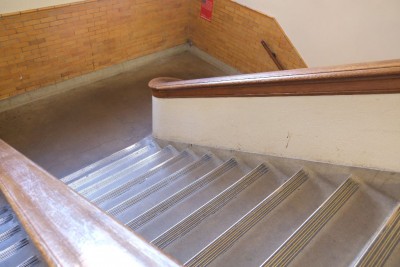Melba’s Best Teachers
A cherished memory of homeschooling our children is sitting on our old couch in our sorta-finished basement den in Urbana, Illinois, reading aloud from the Little House books. I love those books for many reasons but one is the lessons I learned from Ma about being a mama.
I have found another how-to-be-a-mama book in a most unlikely place. Actually the teacher in this book is not a mama but a grandma, Grandma India who lives with and keeps house for her teenage granddaughter Melba, her younger grandson Conrad, and their mama Lois who is a full-time schoolteacher (I never was able to figure out if Grandma India was Lois’ mother or her former husband’s mother).
The book is Warrior’s Don’t Cry by Melba Patillo Beals. It is her first-person account of her life as one of the nine African American students who were the first to integrate Little Rock Central High School in 1957. The book has been a hot topic of conversation around here while we have been making the final decisions about what books to encourage high school students to read while they complete our half year course, Exploring Government, which we are in the process of updating.
In the end, we decided that the book is way too intense for the age group. It is sad that the true story of a fifteen-year-old girl is too intense for children of the same age to read. However, I just finished listening to it last week and am grateful for the opportunity. It is certainly not the sweetest book I have read, but it is one of the most profound. Much of what is profound came from the tongue and life of Grandma India.
As I told you recently, I have watched The Ernest Green Story over and over again. Ray and I have visited Little Rock Central High School and taken the tour, led by the daughter of a National Guardsman who was there on the first day the students attempted to integrate it. I have written a lesson on the story for America the Beautiful. I even grew up during segregation and experienced the integration of my school when I was in the seventh grade.
But now I have heard the story of segregation and integration from a girl who lived it as an African American girl who went inside a battleground every morning and came home in the afternoon to Grandma India, who interpreted it for her from the perspective of a deep faith in God.
I cannot imagine the circumstances that would cause me to let my fifteen-year-old daughter walk into a war zone every day. This battle should have been a grown-up battle. White grown-up groups in Little Rock fomented hatred in the white teens and those white teens threw fire, firecrackers, scalding water, rocks, and horrific verbal abuse on those nine students day after day, and most of the time, teachers stood by and did nothing. African American grown-ups supported the nine in the courts, with training in nonviolence, and in other ways, but the people on the battlefield were children. I could not have sent my child into that.
It took Melba years to be able to write her book and tell the story of the Little Rock integration experience from her perspective. She had kept a journal before and during her year inside Central High and she used it extensively in Warriors Don’t Cry. Many of the journal entries were letters to God.
I loved learning about the beautiful life Melba lived at home and at church. She came from a strong and loving family where faith in God was central. She wrote about her longing for her divorced parents to get back together. She wrote about Mother Lois making her Easter dress. She wrote about Christmas. She wrote about longing to be just a girl again like she was before she became a warrior for integration.
Though I don’t think it was right for fifteen-year-old Melba to have to fight grown-up battles, I marveled at the strength she got from Grandma India’s teachings from the Bible. What happened when that horrible year was finally over illustrates the heart of what Grandma India taught her. Melba and her grandmother went into the backyard. Per her grandmother’s instructions, Melba wrote down the names of each individual who had persecuted and tortured her during the year. Then she burned the names and her school papers from the year. As she burned them, she forgave each one.


As I listened to the book, I thought of the elderly people who have to live with what they did as persecutors back when they were teenagers. I pray they have or will come to Jesus for forgiveness.
And a root issue of the whole problem came into my heart. The problem was that Little Rock high schools were segregated and unequal. White students went to one of the most respected high schools in America. Black students used sparse equipment and hand-me-down books. The solution was to integrate the white school.
The result of this solution that first year was horrible interactions between nine black students and a host of antagonistic white students, egged on by militant segregationist adults. How sad that homeschooling wasn’t an option for them. How sad that children lived through all that. The Little Rock Nine were brave and long-suffering and worthy of praise and esteem, but how very sad that all this happened.
Melba’s best teachers were Grandma India and Mother Lois and those teachings happened just like this:
You shall therefore impress these words of mine on your heart and on your soul;
and you shall bind them as a sign on your hand, and they shall be as frontals on your forehead.
You shall teach them to your sons, talking of them when you sit in your house
and when you walk along the road and when you lie down and when you rise up.
Deuteronomy 11:18-19

